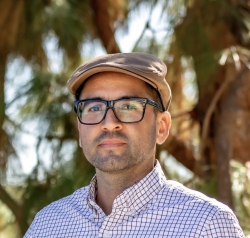Nadia E. Brown
Dr. Nadia E. Brown is a Professor of Government, chair of the Women’s and Gender Studies Program and affiliate in the African American Studies program at Georgetown University. She specializes in Black women’s politics and holds a graduate certificate in Women’s and Gender Studies. Dr. Brown’s research interests lie broadly in identity politics, legislative studies, and Black women’s studies. While trained as a political scientist, her scholarship on intersectionality seeks to push beyond disciplinary constraints to think more holistically about the politics of identity. She is the author or editor of several award winning books – including Sisters in the Statehouse: Black Women and Legislative Decision Making (Oxford University Press); Sister Style: The Politics of Appearance for Black Women Political Elites (with Danielle Lemi); Distinct Identities: Minority Women in U.S. Politics (with Sarah Allen Gershon, Routledge Press); The Politics of Protest: Readings on the Black Lives Matter Movement (with Ray Block, Jr. and Christopher Stout, Routledge Press); Approaching Democracy: American Government in Times of Challenge (with Larry Berman, Bruce Allen Murphy and Sarah Allen Gershon, Routledge Press). Professor Brown is the lead editor of Politics, Groups and Identities. Professor Brown is part of the #MeTooPoliSci Collective where she spearheads efforts to stop sexual harassment in the discipline. Along with co-PIs Rebecca Gill (University of Nevada, Las Vegas) Stella Rouse (University of Maryland, College Park), Elizabeth Sharrow (University of Massachusetts, Amherst) she is the recipient of a million-dollar grant from the National Science Foundation for their project titled “#MeTooPoliSci Leveraging A Professional Association to Address Sexual Harassment in Political Science.” Lastly, Professor Brown is an editor with The Monkey Cage, a political science blog in the Washington Post.

Niambi Carter
Dr. Niambi Carter earned her Ph.D. in Political Science from Duke University (2007) working primarily in the area of American Politics with a specific focus on Race and Ethnic Politics, Black Poltiics, Public Opinion, and Political Behavior. Her book, American While Black: African Americans, Immigration, and the Limits of Citizenship (Oxford University Press), investigates African American public opinion on immigration will be published in 2019. Prof. Carter is also actively involved in other work that examines sanctuary cities, lynching and race in American politics, and the political ideology of African American Republicans. Her work has appeared in the Journal of Politics; Political Psychology; Politics, Groups, and Identities; the Journal of Women, Politics, and Policy; the DuBois Review; Politics and Gender; and many others. She is the recipient of a number of fellowships and awards from organizations such as the Ford Foundation Predoctoral Fellowship, the Consortium for Faculty Diversity Predoctoral Fellowship (Denison University), and the Center for the Study of African American Politics (University of Rochester). She is a native of Prince George’s County, Maryland.

Brad Jones
Dr. Brad Jones is a Professor of Political Science at the University of California, Davis as well as a faculty affiliate with UC Davis’ Global Migration Center. His research interests and expertise encompass the domains of race and ethnic politics, with an emphasis on Latina/o politics. His most recent work addresses questions pertinent to how Latina/os see, interpret, and cope with stereotyping and discrimination. Professor Jones is particularly interested in questions related Latina/o identity and beliefs about discrimination and stereotyping as well as non-Latino perceptions of Latinos and Latino-relevant public policy, such as U.S. immigration policy. His work has been published in the American Political Science Review, American Journal of Political Science, Journal of Politics, Political Behavior, and several other journals. In addition to his work in the field of race and ethnic politics, Professor Jones has also published widely in the field of political methodology, including the Cambridge University Press book, Event History Modeling for the Social Sciences, co-authored with Janet Box-Steffensmeier. Outside of academia, Professor Jones works extensively on humanitarian issues in the Arizona/Sonoran (MX) desert. In conjunction with Humane Borders, Professor Jones assists with their efforts to provide water to migrants crossing through the Sonoran desert. He is an authorized Humane Borders driver for the Organ Pipe National Monument water stations. As a proud third-generation Mexican American, he honors the opportunity to assist migrants in need in the U.S.-Mexico border zone.

Michael Jones-Correa
Dr. Michael Jones-Correa is the President’s Distinguished Professor of Political Science and Director of the Center for the Study of Race, Ethnicity and Immigration (CSERI) at the University of Pennsylvania. He taught previously at Harvard and Cornell, where he served as the Robert J. Katz Chair of the Department of Government from 2014-2016. He is a co-author of Latinos in the New Millennium (Cambridge, 2012) and Latino Lives in America: Making It Home (Temple, 2010), the author of Between Two Nations: The Political Predicament of Latinos in New York City (Cornell, 1998), the editor of Governing American Cities: Inter-Ethnic Coalitions, Competition and Conflict (Russell Sage Foundation, 2001) and co-editor of Outsiders No More? Models of Immigrant Political Incorporation (Oxford 2013). He has been a co-PI for the 2006 Latino National Survey, the Philadelphia-Atlanta Project, and the Latino Immigrant National Election Survey (LINES), as well as the author of several dozen publications on immigration, race, ethnicity and citizenship in the United States. This research has received support from the Carnegie, Ford, MacArthur, Russell Sage and National Science foundations, among others. Jones-Correa has been a visiting fellow at the Russell Sage Foundation, the Woodrow Wilson International Center for Scholars and the Center for the Study of Democratic Politics at Princeton University, and was the team leader and ISS fellow for the 2010-2013 theme project “Immigration: Settlement, Immigration and Membership,” at the Institute for the Social Sciences at Cornell. He currently serves as a member of the Board of Trustees of the Russell Sage Foundation.

Jane Junn
Dr. Jane Junn is Professor of Political Science at the University of Southern California. She is the author of five books on political participation and public opinion in the United States. Her most recent book The Politics of Belonging: Race, Immigration, and Public Opinion (with Natalie Masuoka), was published in 2013 by the University of Chicago Press. Her first book, Education and Democratic Citizenship in America (with Norman Nie and Ken Stehlik-Barry, University of Chicago Press, 1996), won the Woodrow Wilson Foundation award from the American Political Science Association for the best book published in political science. She is also the author of Civic Education: What Makes Students Learn (with Richard G. Niemi, Yale University Press, 1998), New Race Politics: Understanding Minority and Immigrant Politics (edited with Kerry L. Haynie, Cambridge University Press, 2008), and Asian American Political Participation: Emerging Constituents and their Political Identities (with Janelle Wong, Karthick Ramakrishnan and Taeku Lee, Russell Sage Foundation, 2011). Her research articles on political behavior, public opinion, racial and ethnic politics, the politics of immigration, gender and politics, and political identity have appeared in journals including Perspectives on Politics, The DuBois Review, Politics & Gender, American Politics Research, and the American Behavioral Scientist. Jane has been Vice President of the American Political Science Association, a Fulbright Senior Scholar, and the recipient of an Outstanding Teacher Award from Columbia University Teachers College. She was a member of the Social Science Research Council National Research Commission on Elections and Voting and a member of the National Academy of Science Committee on the U.S. Naturalization Test Redesign. She was the director of the USC – Los Angeles Times Poll during the 2010 California election. She is currently at work on a new book on the “gender gap” and voting in the United States.

Tyson D. King-Meadows
Dr. Tyson D. King-Meadows is a dean who leads the College of Liberal Arts at the University of Massachusetts-Boston. Prior to this appointment Dr. King-Meadows served professor of political science and associate provost for strategic initiatives in the Office of the Provost at the University of Maryland Baltimore County. He also previously served as chair of the department of Africana Studies at the University of Maryland Baltimore County. His primary research interests concern African American political behavior and attitudes, identity politics, race and representation, Congress, and elections. He is active in the American Political Science Association (APSA) and the Midwest Political Science Association (MPSA). He served as president of the National Conference of Black Political Scientists (NCOBPS). Dr. King-Meadows has achieved local, regional, state, national, and international recognition for his work. In 2019-2020, he was awarded the American Council on Education (ACE) Fellowship, serving in the Provost’s Office at Case Western Reserve University. Dr. King-Meadows is particularly interested in exploring the impact of black political engagement, civil rights law, identity group politics, and racial representation on the black socioeconomic condition from the latter twentieth century to present day. His 2011 book, When the Letter Betrays the Spirit: Voting Rights Enforcement and African American Participation from Lyndon Johnson to Barack Obama(Lexington Books),draws from government data, legislative history, Supreme Court decisions, survey results, and the 2006 reauthorization debate to examine how executive and judicial discretion facilitates violations of the Voting Rights Act. While challenging the executive-centered model of leadership on voting rights, this book puts forth a Congress-centered leadership model that would satisfy the goals of the black civil rights movement and give fuller support to the Fifteenth Amendment.

Jessica Lavariega Monforti
Dr. Jessica Lavariega Monforti is a dean who leads the College of Arts and Sciences at California Lutheran University to support the academic endeavors and development of faculty, students, and staff, and our institution. Dr. Lavariega Monforti believes that education can empower students and help them and others acknowledge their potential. Dr. Lavariega Monforti has landed over $4M in major grant funding, published 3 books and over 50 articles and book chapters, and contributed to several news articles and broadcasts including the New York Times, La Opinión, and NPR’s All Things Considered. Dr. Lavariega Monforti is an award-winning teacher, leader, and scholar, having received the UT Regents’ Outstanding Teaching Award, Adaljiza Sosa-Riddell Award for Exemplary Mentoring of Latino/a Undergraduate Students in Political Science, various best research paper awards from major political science associations, as well as institutional leadership awards. She is the founder and co-organizer of the biennial, national Women of Color in Political Science Workshop. Dr. Lavariega Monforti holds a PhD in Political Science from The Ohio State University.

Pei-te Lien
Dr. Lien’s primary research interest is the political participation and representation of Asian and other nonwhite Americans. Most of her recent work examines the intersection of race, ethnicity, gender, and nativity in political behavior, both of the elites and the mass. She is a co-principal investigator of the Gender and Multicultural Leadership project http://www.gmcl.org and a co-author of Contested Transformation: Race, Gender, and Political Leadership in 21st Century America (Cambridge UP, 2016) based on this project which won the 2017 Distinguished Career Book Award from the American Political science Association (APSA) Section on Race, Ethnicity, and Politics. The dataset is available online as ICPSR Study No. 36826. In 2018, she co-edited with Andrew Aoki for the Politics, Groups, and Identities a special issue on Asian Pacific American Studies (6:3), which has since been published as a book Asian Pacific American Politics—Celebrating the Scholarly Legacy of Don T. Nakanishi (Routledge 2020) after adding additional articles curated from the journal. In addition to numerous journal articles and book chapters, Lien has published four other book titles. The Making of Asian America Through Political Participation (Temple UP, 2001), received the 2002 best book award on political participation, voting, elections, and political behavior from the American Political Science Association’s Division on Race, Ethnicity, and Politics. The Politics of Asian Americans: Diversity and Community (Routledge, 2004), coauthored with M. Margaret Conway and Janelle Wong, is based on her National Science Foundation-sponsored Pilot National Asian American Political Survey (SES-9973435). The dataset is available online as ICPSR Study No. 3832. Co-edited with Chris Collet, The Transnational Politics of Asian Americans (Temple UP, 2009) explores the world of political transnationalism regarding various Asian American groups. She served on the editorial boards of the American Political Science Review, Polity, and Journal of Women, Politics & Policy and was a co-editor of Politics, Groups and Identities, a journal of the WPSA.

Valerie Martinez-Ebers
Dr. Valerie Martinez-Ebers is a University Distinguished Research Professor of Political Science and Director of the Latino and Mexican American Studies Program at the University of North Texas. She is a former Vice-President of the American Political Science Association and a former President of the Western Political Science Association. From 2012-2016, she served as Co-Editor of the American Political Science Review. Dr. Martinez-Ebers has published widely on a variety of topics associated with the politics of race and ethnicity, including articles in all the top journals of her discipline. She is co-author of Politicas: Latina Public Officials in Texas (2008); Latino Lives in America: Making it Home (2010); Latinos in the New Millennium: an Almanac of Opinion, Behavior and Policy Preferences (2012) and Human Relations Commissions: Relieving Racial Tensions in the American City (forthcoming 2020). She also edited Perspectives on Race, Ethnicity and Religion: Identity Politics in America (2009), an anthology that examines the history, current issues and dynamics of minority groups in the United States. She was co-principal investigator for the Latino National Survey, an 8,643-respondent, state-stratified survey funded by the Ford, Carnegie, Russell Sage, Hewlett, Joyce, and National Science Foundations.

Natalie Masuoka
Dr. Natalie Masuoka’s research interests include racial and ethnic politics, immigration, political behavior and public opinion. Her first book, The Politics of Belonging: Race, Public Opinion and Immigration (co-authored with Jane Junn) examines how and why whites, blacks, Asian Americans and Latinos view immigration and immigrants in systematically different ways. This book was the winner of the 2014 Ralph Bunche Award by the American Political Science Association. Her second book, Multiracial Identity and Racial Politics in the United States, explores the rise of Americans who self-identify as mixed race or multiracial and the impact on politics. This book was recognized as the best book in political behavior by the Race, Ethnicity and Politics Section of the American Political Science Association. Professor Masuoka received her Ph.D. and M.A. from University of California, Irvine and a B.A. from CSU Long Beach. Before joining UCLA she taught at Tufts University and Duke University.

Jerry Z. Park
Dr. Jerry Z. Park is an Associate Professor of Sociology and an affiliate fellow of the Baylor Institute for Studies of Religion. His research interests include the sociological study of religion, race, identity, culture and civic participation. His publications have covered topics such as Asian-American religiosity, pan-ethnic/ racial identity meanings, generational transmission, civic volunteering, Asian American stereotype effects, racialized religion in American surveys, religion and workplace attitudes, religious attitudes of academic scientists. These studies have appeared in Social Psychology Quarterly, Social Forces, The Sociological Quarterly, and the Journal for the Scientific Study of Religion among others. His recent research focuses on the identities of and attitudes toward racial and religious minorities with particular attention to Muslim Americans. These studies make use of representative and non-probability samples as well as a field experiment on racial and religious bias in employment hiring. To date this research has been funded in part by the National Science Foundation, the John Templeton Foundation, and the Society for the Scientific Study of Religion. Since 2017, he serves as associate editor for the Journal for the Scientific Study of Religion and is an editorial board member for Social Psychology Quarterly. He has served on the advisory panel for the Pew Research Center’s Asian American Survey as well as a consultant on the Baylor Religion Surveys.

Efren Perez
Dr. Efrén Pérez is Professor of Political Science and Psychology. His research centers on political psychology, with specific interests in racial and ethnic politics, language and political thinking, implicit political cognition, and the measurement of political concepts. He has published numerous articles in leading political science and general science journals, including Proceedings of the National Academy of Sciences, American Journal of Political Science, Journal of Politics, Political Behavior, and Political Psychology. He is also the author of an award-winning book titled, Unspoken Politics: Implicit Attitudes and Political Thinking (Cambridge University Press). Beyond his research, Efrén directs the Race, Ethnicity, Politics, and Society (REPS) Lab.

Dianne M. Pinderhughes
Dr. Dianne Pinderhughes is Notre Dame Presidential Faculty Fellow, and Professor in the Department of Africana Studies and the Department of Political Science; she holds a concurrent faculty appointment in American Studies, is a Faculty Fellow at the Kellogg Institute, and is a Research Faculty member in Gender Studies at the University of Notre Dame. Her research addresses inequality with a focus on racial, ethnic and gender politics and public policy in the Americas, explores the creation of American civil society institutions in the twentieth century, and analyzes their influence on the formation of voting rights policy.
Pinderhughes’s publications include Uneven Roads: An Introduction to US Racial and Ethnic Politics (co-author; 2014); Race and Ethnicity in Chicago Politics: A Reexamination of Pluralist Theory (1987); Black Politics After the Civil Rights Revolution: Collected Essays (forthcoming); Race, Gender, and the Changing Face of Political Leadership in 21st Century America (co-author; forthcoming). She is a member of the National Advisory Committee of the Robert Wood Johnson Foundation Scholars in Health Policy Research Program; she was a member of and then Vice Chair of the Board of Governors of the Joint Center for Political and Economic Studies. She was President of the American Political Science Association 2007-08, and the APSA Task Force she appointed completed its report in 2009: Political Science in the 21st Century. Pinderhughes is 1st Vice President of the International Political Science Association and Co-Chair of its 2016 Istanbul World Congress. Pinderhughes has also been a Fellow at the Woodrow Wilson International Center for Scholars (2003-04).

Ricardo Ramirez
Dr. Ricardo Ramírez is Associate Professor of Political Science at the University of Notre Dame. His broad research interests include political behavior, state and local politics, and the politics of race and ethnicity. His research is geared to understanding the transformation of civic and political participation in American democracy by focusing on the effects of political context on participation, the political mobilization of and outreach to Latino immigrants and other minority groups, and the causes and consequences of increasing diversity among elected officials. He is Principal Investigator of a longitudinal study of gendered career paths among Latina/o elected officials since 1990 and coeditor of Transforming Politics, Transforming America: The Political and Civic Incorporation of Immigrants in the United States. His most recent writings include: “Mobilization en Español: Spanish-language Radio and the Activation of Political Identities,” “Transnational Stakeholders: Latin American Migrant Transnationalism and Civic Engagement in the United States,” “Why California Matters: How California Latinos Influence the Presidential Election,” “Political Protest, Ethnic Media and Latino Naturalization,” and “Latinos during the 2006 Immigration Protest Rallies.”

Gabriel Sanchez
Dr. Gabriel R. Sanchez, PhD. is a Professor of Political Science, and the Founding Robert Wood Johnson Foundation Endowed Chair in Health Policy at the University of New Mexico. Dr. Sanchez is also the Director of the UNM Center for Social Policy, and a founding member of the UNM Native American Budget and Policy Institute. Sanchez is also a Principal at Latino Decisions, the nation’s leading survey firm focused on the Latino electorate, is a non-Resident Senior Fellow in Governance Studies at the Brookings Institution, and leading expert on Latino and New Mexico politics and policy, he regularly provides political commentary to several state, national, and international media outlets including the New York Times, CNN, Los Angeles Times, and the Economist. Professor Sanchez is a nationally recognized expert in survey research and the utilization of rigorous research to inform public policy decisions at the federal, state, and local levels. Sanchez has been on the faculty at UNM since 2005 and is a native New Mexican, and a graduate of St. Pius X High School here in Albuquerque. Dr. Sanchez is leading several research projects focused on the impact of COVID-19 on the Latino and Native American communities, including multiple survey of parents aimed at understanding the experiences of parents regarding distance learning and their attitudes toward the transition back to in-person education. Sanchez has also directed several research projects for clients interested in developing strategies to engage Latino voters and promote civic engagement.Along with LD’s co-founder Matt Barreto, Sanchez has written several expert witness reports utilized in voter ID and voting rights cases across the country. Sanchez received his Ph.D. in Political Science from the University of Arizona. His academic research explores the relationship between racial/ethnic identity and political engagement, Latino health politics and policy, and minority legislative behavior. Sanchez has published more than fifty peer-reviewed scholarly research articles, several books and book chapters focused on minority public opinion, electoral behavior and racial and ethnic politics in the United States. This includes being the co-author of the recent book Latinos and the 2016 Election:Latino Resistance and the Election of Donald Trump, and co-author of the forthcoming text book (with John A. Garcia) Latino Politics in America: Community, Culture, and Interests.

David O. Sears
Dr. David O. Sears is Distinguished Professor Emeritus of Psychology and Political Science, former Dean of Social Sciences, and former Director of the Institute for Social Science Research, all at the University of California, Los Angeles. Dr. Sears received his B.A. in History from Stanford University, his Ph.D. in Personality and Social Psychology from Yale University in 1962, and since then has taught at UCLA. He has held visiting faculty positions at Harvard University and the University of California, Berkeley, has been a Fellow at the Brookings Institution and twice at the Center for Advanced Study in the Behavioral Sciences, and has been a Guggenheim Fellow. In 1991, he was elected Fellow of the American Academy of Arts and Sciences; in 1992, President of the Society for the Advancement of Socio-Economics; and in 1994, President of the International Society of Political Psychology. His books include Public Opinion (1964, with Robert E. Lane), The Politics of Violence: The New Urban Blacks and the Watts Riot (1973, with John B. McConahay), Tax Revolt: Something for Nothing in California (1982, with Jack Citrin), Political Cognition (1986, edited with Richard R. Lau), Racialized Politics: The Debate about Racism in America (2000, edited with Jim Sidanius and Lawrence Bobo), Social Psychology (12 editions from 1970 to 2006, with Shelley E. Taylor and L. Anne Peplau), Obama’s Race: The 2008 Election and the Dream of a Post-Racial America (2010, with Michael Tesler), the Oxford Handbook of Political Psychology, (2 editions from 2003 to 2013, edited with Leonie Huddy and Jack Levy), and American Identity and the Politics of Multiculturalism (2014, with Jack Citrin). He has published articles and book chapters on a wide variety of topics, including attitude change, public opinion, mass communications, ghetto riots, political socialization, voting behavior, and race and politics.

Alyasah Sewell
Dr. Alyasah “Ali” Sewell is Associate Professor of Sociology at Emory University. Their work examines the political economy of race and its empirical links to racial health(care) disparities. They specialize in quantifying the health(care) ramifications of supraindividual (i.e., above the individual) racism coupling a neighborhood effects research data with policing and housing policy data. Their research has been published in a wide array of sociological and interdisciplinary outlets, including Social Science and Medicine, Social Science Research, Sociological Forum, Sociology of Race and Ethnicity, Du Bois Review, Ethnic and Racial Studies, Journal of Urban Health, Journal of Health Politics, Policy, and Law, and Nature. Their scholarship has garnered support and recognition from the National Institutes of Health, the Ford Foundation, the National Science Foundation, the Society for the Study of Social Problems, the Inter-University Consortium for Political and Social Research, and the Planned Parenthood Federation of America. They received their Ph.D. and M.A. in Sociology from Indiana University and their B.A. summa cum laude in Sociology from the University of Florida with a minor in Women’s Studies.

Chris Zepeda-Millan
Dr. Chris Zepeda-Millán is Associate Professor of Public Policy, Chicana/o Studies, and Political Science at UCLA. His research has been published in top political science and interdisciplinary academic journals, such as the American Journal of Political Science (AJPS), Political Research Quarterly (PRQ), Politics, Groups and Identities (PGI), Critical Sociology, the Chicana/o Latina/o Law Review, Social Science Quarterly (SSQ), and the Journal of Ethnic and Migration Studies (JEMS). His first book, Latino Mass Mobilization: Immigration, Racialization, and Activism (Cambridge University Press) received multiple national honors, including the prestigious Ralph J. Bunche “Best Book on Ethnic and Cultural Pluralism Award” from the American Political Science Association (APSA), the “Best Book on Race and Immigration Award” from the Race, Ethnicity, and Politics (REP) Section of the APSA, and the coveted “Charles Tilly Distinguished Contribution to Scholarship Book Award” from the American Sociological Association’s Section on Collective Behavior and Social Movements. He is currently working on multiple research projects, including a co-authored book tentatively titled, Walls, Cages, and Family Separation: Immigration Policy in the Time of Trump (2020). Prior to joining UCLA Professor Zepeda-Millán was a Provost Postdoctoral Scholar in the Department of Political Science at the University of Chicago, as well as a faculty member at Loyola Marymount University and UC Berkeley, where he chaired the Center for Research on Social Change. Born and raised in the East Los Angeles barrio of Boyle Heights, Dr. Chris Zepeda-Millán was the first Chicano to receive a Ph.D. from the Department of Government at Cornell University.

